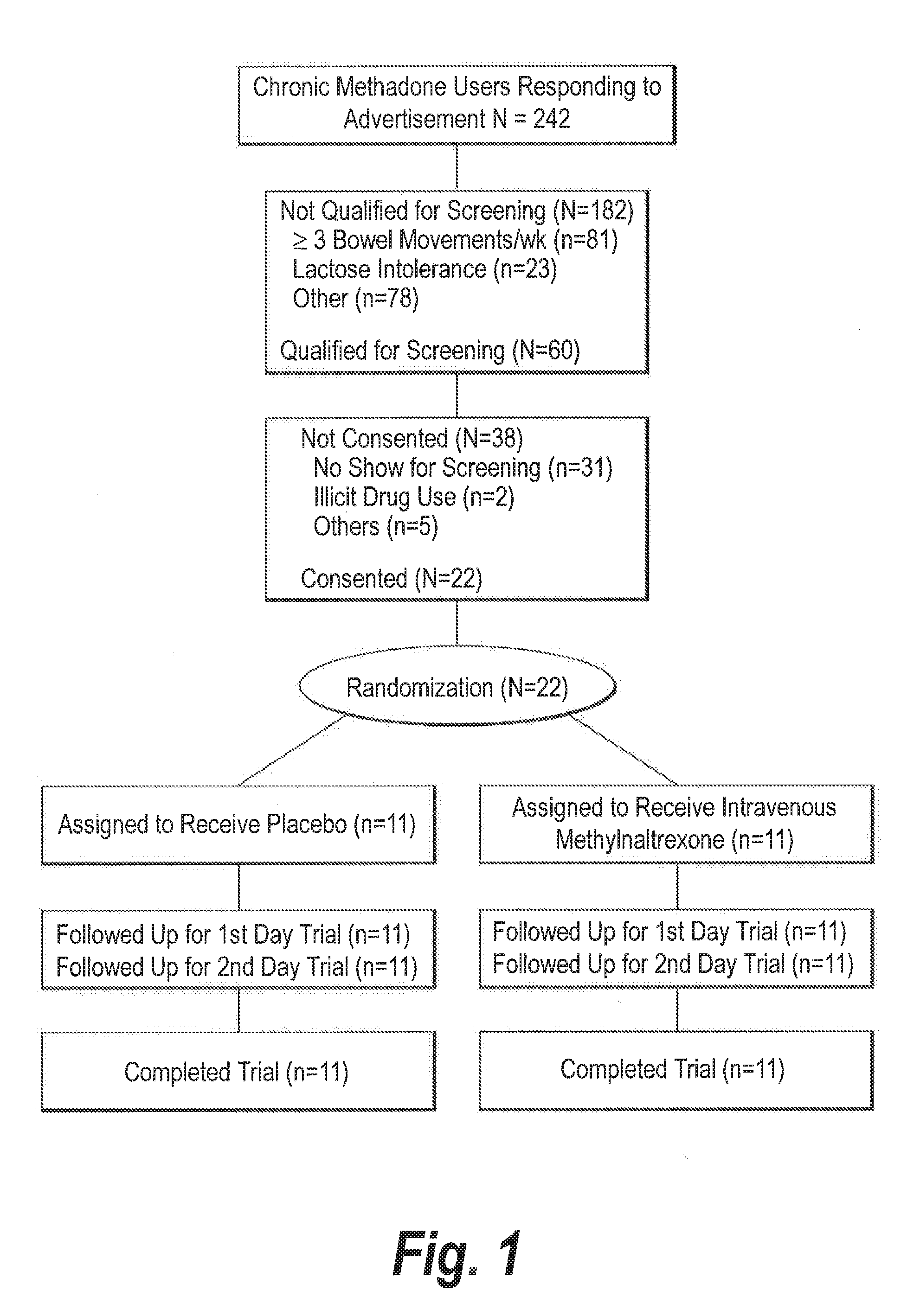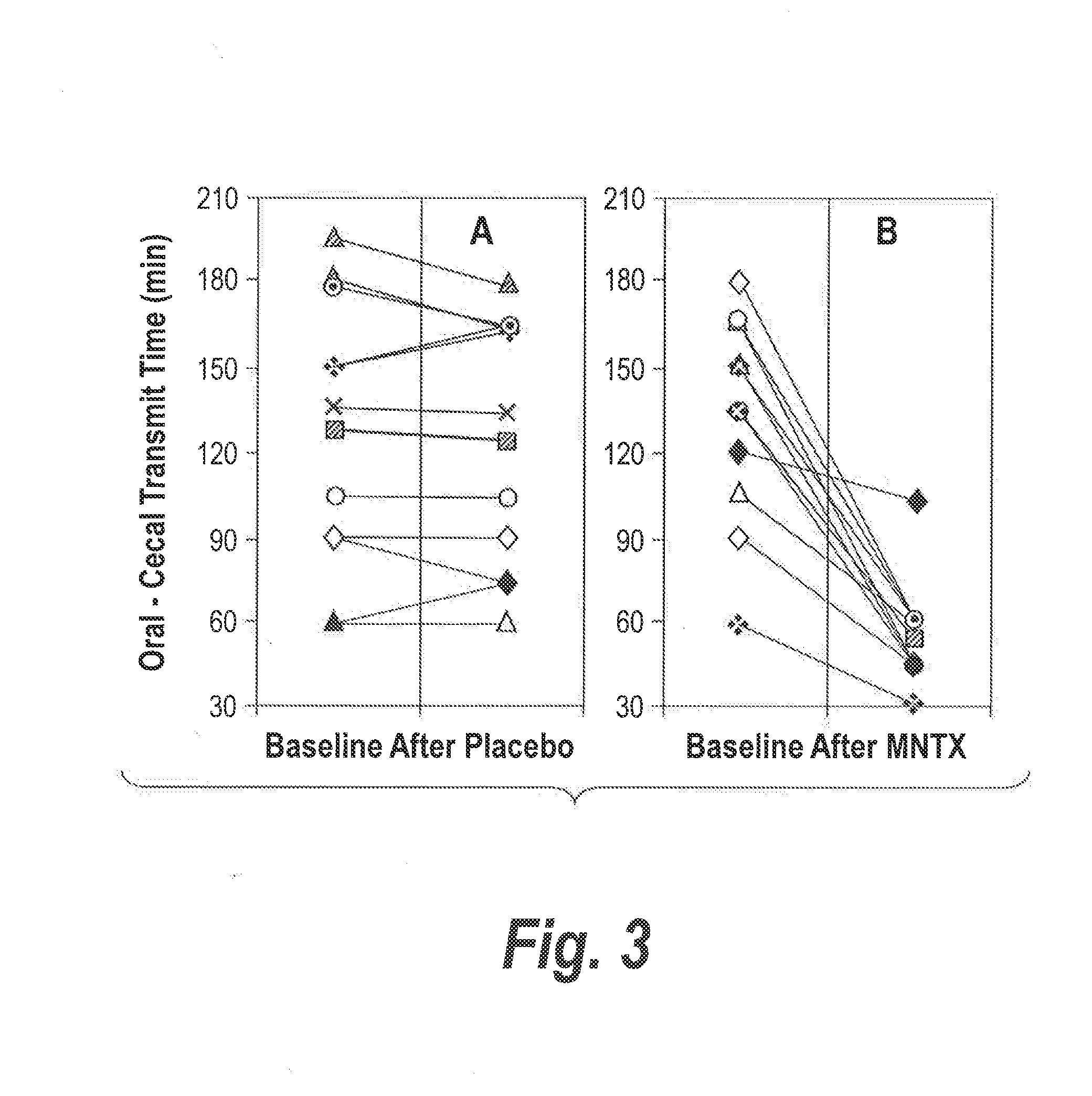Use of methylnaltrexone and related compounds to treat constipation in chronic opioid users
a technology which is applied in the direction of heterocyclic compound active ingredients, drug compositions, biocides, etc., can solve the problems of insufficient attention to the significant negative impact of bulking agents and laxatives on the use of methylnaltrexone and related compounds is associated with a number of undesirable side effects, so as to improve the quality of life of patients, and prolong the effect of treatmen
- Summary
- Abstract
- Description
- Claims
- Application Information
AI Technical Summary
Benefits of technology
Problems solved by technology
Method used
Image
Examples
example 1
Effects of Standard MNTX Dosage on Chronic Opioid Patients
Subjects
[0030]With approval from the Institutional Review Board at the University of Chicago, two male and two non-pregnant female adults participating in a methadone maintenance program were enrolled in this study. All four subjects were African Americans. Their mean age±SD (range) was 45.3±8.6 (35-56) years. Subjects in this study met the following inclusion criteria: (1) They were currently enrolled in a methadone maintenance program for at least 1 month; (2) they experienced methadone-induced constipation, i.e. less than one bowel movement in the previous 3 days or less than three bowel movements in the previous week (O'Keefe et al., J. Gerontol., 50:184-189 (1995); Parup et al., Scand. J Gastroenterol, 33:28-31 (1998)). Exclusion criteria were as follows: (1) History or current evidence of significant cardiovascular, respiratory, endocrine, renal, hepatic, hematological or psychiatric disease; (2) any laboratory findings...
example 2
Effects of Variable MNTX Dosage on Chronic Opioid Patients
[0048]This Example was a double-blind, randomized, placebo-controlled trial, evaluating the effects of methylnaltrexone in treating chronic opioid-induced constipation. We conducted this trial using subjects in a methadone maintenance program, in which approximately 60% of the chronic methadone users have constipation. These subjects served as a proxy group for advanced cancer patients to evaluate the efficacy of methyl naltrexone on chronic opioid-induced constipation.
[0049]With approval from the Institutional Review Board, 9 male and 13 non-pregnant, non-breastfeeding female adults were enrolled (FIG. 1). Their mean age±S.D. (range) was 43.2±5.5 (25-52) years. Subjects met the following inclusion criteria: (1) Enrollment in a methadone maintenance program for >1 month; (2) Methadone-induced constipation, i.e., 0-1 bowel movement in the previous three days, or 0-2 bowel movements in the previous week; (3) No laxative use two...
example 3
Effects of Oral Administration of MNTX on Chronic Opioid-Induced Constipation
[0070]Since oral medication is a safer and more convenient way to deliver drugs than is intravenous administration, the efficacy of oral MNTX in relieving constipation in methadone maintained patients was evaluated. Twelve constipated adults (≦2 stool / week) were enrolled. Their daily methadone dose was 73.3±16.2 mg (41-100 mg), mean±SD (range). On day 1 at 9 AM, subjects ingested 10 g lactulose (Solvay Pharmaceuticals) to assess oral-cecal transit time as described above, and a placebo capsule. On day 2 at 9 AM, subjects again received lactulose, and a capsule containing methylnaltrexone (Mallinckrodt). Ascending oral methylnaltrexone doses (0.3, 1.0, and 3.0 mg / kg) were given to 3 groups of 4 subjects per group. Drug administrations were single-blinded to the subject. Laxation response and potential opioid withdrawal were recorded and blood samples were collected.
[0071]None of the 12 subjects showed laxati...
PUM
| Property | Measurement | Unit |
|---|---|---|
| concentrations | aaaaa | aaaaa |
| transit time | aaaaa | aaaaa |
| transit time | aaaaa | aaaaa |
Abstract
Description
Claims
Application Information
 Login to View More
Login to View More - R&D
- Intellectual Property
- Life Sciences
- Materials
- Tech Scout
- Unparalleled Data Quality
- Higher Quality Content
- 60% Fewer Hallucinations
Browse by: Latest US Patents, China's latest patents, Technical Efficacy Thesaurus, Application Domain, Technology Topic, Popular Technical Reports.
© 2025 PatSnap. All rights reserved.Legal|Privacy policy|Modern Slavery Act Transparency Statement|Sitemap|About US| Contact US: help@patsnap.com



